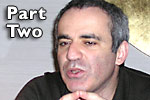


New York City, the week of March 20, 2005 – Mig Greengard spent the week with Garry Kasparov and kept his new digital recorder handy. After that came the typing up 20 pages of transcript! (Yes, twenty.) Part 1 included retirement, computers and Deep Blue, and a look at Kasparov's own chess and other chessplayers. This Part 2 includes Kasparov's picks for his best games and career achievements, a look back, and the future of professional chess. Part 3 will focus on his political ideas and aspirations.
If you could pick five of your games for the only chess book that is going to be preserved...
It’s actually going to be quite a problem for me to collect my best games. Even by my judgment there are many that qualify at the highest standards. Let’s see, games 16 and 24 from Moscow, game 24 from Seville, Korchnoi ‘82 in Lucerne, and the Topalov game. But then you’re missing game 22 St. Petersburg with Nd7, the sealed move. Okay, so those would five good and memorable ones. But really game 24 from the Seville match wasn’t a great game. So maybe cut that one and I’d take Anand, game ten of the [1995] New York world championship match.
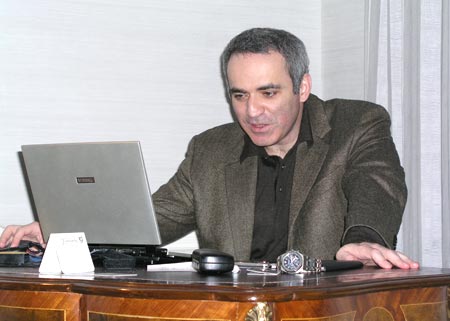
What criteria are you using?
The Seville game would be just as a sort of heroic accomplishment. Korchnoi was sort of a world recognition game. Games 16 and 24 from Moscow were great ideas and important games. Also, the decisive game of the match and a great novelty. Topalov, probably best combination ever.
By pure chess standards it would be the two with Karpov, 16 and 24. The Anand and Topalov games, and... hmm... I would add to this list, the Astana game against Kramnik, the Berlin Wall with e6. Runner-ups would be the Seville and Korchnoi games. But I had a problem making a list of thirteen best games! I had modest aspirations of having thirteen “best of the best” games.
But in volumes nine and ten of my works [that include My Great Predecessors], I think will include over 250 of my best games. I don’t think it will be too hard to collect that many, honestly.

Game 16 vs Karpov in 1986 and vs Topalov at Corus, 1999
Replay and download Kasparov's best of the best from the MegaBase.
Do you distinguish between games with great preparation and games with great over-the-board inspiration? I know many fans are quick almost dismiss games with brilliant novelties because they were prepared at home.
This is a sort of myth, really. I don’t have that many of these, although of course I prepared a lot. I don’t think in my matches with Karpov that I outplayed him in the openings. Karpov probably had more openings that influenced the course of the matches than I did.
How about the Anand game 10 novelty?
It was a great idea to sacrifice the rook; it came to me while I was walking in Battery Park [NYC]. It’s part of history, an amazing game that influenced chess. In the Anand game, nowadays the machine would go through it in a second. Computers were too weak back then. But what the machine showed then was 19.Bh6!
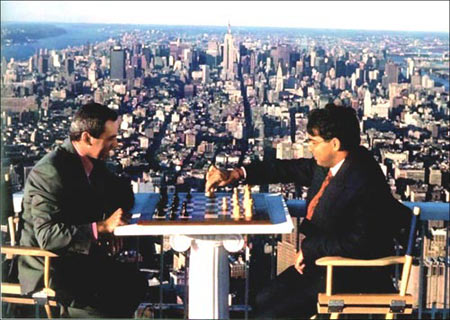
At the World Trade Center in 1995.
Doesn’t it cheapen things nowadays that computers are so strong and contribute so many novelties? When a game ends the first thing everyone wants to know is how much of it was preparation.
Anand told me a funny story that in 1982 they were studying the game Kasparov-Korchnoi from Lucerne, 1982. He said they were amazed, Anand’s word. (Maybe he was more relaxed after my retirement!) He said someone said, “maybe it was all preparation!” But come on, this is part of the myth.
Well, there is some truth to this myth, no? How about your game with black against Kramnik at Linares, 1999? All the computers were at +3 for Kramnik, he’s crashing through the center, it looks doomed. Then you play the king lift, the rook comes down, sacrifices itself and it’s a draw. You’d both looked at it in preparation, but you’d gone further, despite the computer’s evaluation. That was 35 moves of preparation.
Well, at +3 sometimes the game is over, but there are situations... It’s about your nose, you think you need to wait a bit, look a little deeper.
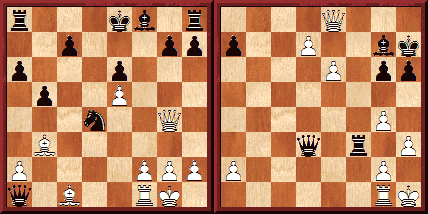
Game 10 vs Anand in 1995 and the draw vs Kramnik at Linares, 1999
What will you do with all the analysis you accumulated?
I won’t sell it, I may share it with some players if it’s appropriate. It won’t be wasted, for sure. But I’ll keep renewing it, I have to keep my brain fresh. I’ve been watching the Melody Amber tournament and it was quite funny, the game Anand-Shirov, in the Petroff. Anand beat him in the blindfold. It was this idea, taking with the rook on e5. When we played in Linares, I played 22.Ne5 and offered him a draw. That gave me the trophy, so it was hard to play on.
After the game I said to Vishy that if I take with the rook instead of the bishop it could be interesting. The knight goes to g6, not f5, and then I exchange the rooks, you control the e-file but the bishop on g3 is well located and you have some problems locating your pieces. Anand played Shirov and used it and it worked perfectly!

Okay, time to look back, although maybe it’s still a little early. What regrets do you have?
1993, definitely. That was a mistake. Even though FIDE was corrupt, the best way to proceed was to negotiate with them. What we tried to do in 1995 from a position of weakness was different. There were enemies who didn’t want me back by then. In 1993 I could have negotiated from the position of undisputed world champion. It was complicated by the fact that Nigel was very suspicious and Ray Keene wanted to do anything to destroy relations with FIDE. I was also pressed by the crisis in the Russian chess federation. So it was a difficult moment.
I was so frustrated with FIDE, and my mistake was thinking that Nigel could carry the support of the western players. I still had images of [the GMA meeting in] Murcia, when there was a split between East and West. I thought we could build something, opposing FIDE and having corporate sponsors. In fact we had corporate sponsors, that’s the irony. We had sponsors but no western players supported us! Everybody just played to make money but without supporting us. [Much more on this here.]
 How different is the game now from when you found it?
How different is the game now from when you found it?
It’s a brand new game, a new world. When I started out, the Informant was the greatest collection of games, the most valuable thing, especially in the USSR where there were few books available. Today, PING!, one mouse click and it’s all there. And we had adjournments, so much analysis. We analyzed games and had to learn so much on our own. Now it’s all there for you.
Now information doesn’t belong to anyone, not for long. You don’t have to collect bits of information on note cards. Unfortunately, moving from place to place I lost all my old stuff in my own hand from the early and mid-70’s. We had a few books and we had to pick out the valuable games by our own evaluation. Now you have Garry Kasparov on DVD, telling you how to play the Queen’s Gambit Declined, can you imagine? Back then when Botvinnik told us any little thing we would contemplate it for ten minutes! Now everything is on the computer. Your analysis, your research. And you can play on the computer now, go right over there and play on the internet.
How about the politics back then?
Chess was not just corrupt, it was a game that belonged to the domain of the Soviet Union. It was a Communist-controlled game. The best players all came from that part of the world and the Soviet influence was so strong that it reproduced its cronyism. FIDE politics was rotten, always rotten. It didn’t work on normal professional terms, with commercial sponsorship, advertising, events in big cities. It all stayed within this political domain.
That’s why the biggest events in chess were political events. Fischer-Spassky, political. Karpov-Fischer, well, it didn’t happen, but was also political. Karpov-Korchnoi, political. Why were my matches with Karpov successful? Because they were political. February, 1985 made these events highly political. Selling only politics one day had to backfire on us. When there were no more politics to sell, there was nothing. The last one was Nigel against me in London, but it was more contrived.
And what do we have now? No business. My attempts to change the rules failed, and I didn't have much support. I spoke to many leading players at the time and no one wanted to come on board. I explained that we’d be in trouble, that we needed commercial sponsors and that they need a total package, a calendar, conditions. Ten years after Intel left chess we’re still at square one. Not even there, we’re off the board!
I was bankable because I was a professional. People could see I was a professional and I promoted the game of chess. I was not part of this political system. I was ready to communicate and I was the best for a long time so I could establish a brand.
Then are we going to see a negative impact from your exit? Will prize funds drop?
Where? They can’t drop any further! Look at the Linares Open. It was a very strong event five years ago. We had many Grandmaster of the category of Beliavsky. Now, nobody, barely any 2600 players.

A winning team. Analyst Yuri Dokhoian and Garry's mother, Klara Kasparova.
Tiger Woods recently said he would retire when his best wasn’t good enough.
My problem was that my best was always enough to be the best! Maybe now that I’m gone the rest will be inspired to a new level. I was part of the debate and now maybe they can concentrate on the game and do something different. They always complained that I was there, and now Peter Svidler even said in public, “The big ego was among us, now without him we can negotiate.” Okay, fine, now it’s your turn to do something. I made money from chess but I brought money into chess, much more than I made myself. Now it's up to them.
In My Great Predecessors you write about the evolution of chess over the decades. As with evolution in nature it’s hard to see up close. When you look at the top few players, the top five or ten, do they play at the level you and Karpov were playing at in the early 1980’s? Has there been an increase in sophistication and quality?
There is increasing sophistication, but as for quality... When I played Karpov there were two of us well ahead of the rest. Today, can you say Anand is so much better than Leko? You have Anand, Kramnik, Leko, Mickey, Topalov...
Okay, but are they better than you and Karpov were in 1983?
Technically speaking, better because every new generation is better than the previous generation.
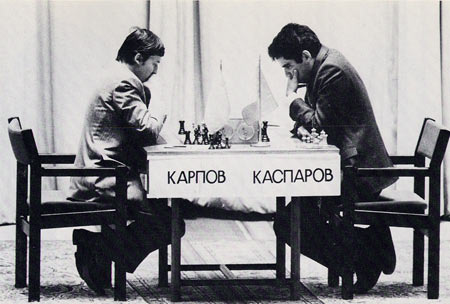
But is the quality of the chess in the middlegame now better than 20 years ago? Openings are another matter. Any GM today could, technically, play better in the opening than you did then because of databases.
I think the quality of the chess we played in Leningrad in 1986 was phenomenally high. I don’t think today’s players could beat that. In my view that was the best match we played and I don’t think they will ever reach it.
Today’s players know more even in the middlegame positions because they learned from us, but in terms of the decision-making processing in ’86, no way. I think of the great events I played in ’89, Tilburg, Belgrade, the first half of Linares 1990, before I lost to Gulko. That was very high quality. And of course 1999. I think that was probably my best year. The quality of my decision-making and energy, I think it was the highest ever in the history of chess. Wijk aan Zee, Linares... I was well ahead of the rest with new ideas, and with more determination. I think my all-time peak was in Frankfurt, 1999, winning the rapid chess. That was the peak. I don’t think I ever reached that again. Even descending I won quite a few more tournaments in a row, maybe seven, not including the Kramnik match.
 Another peak period was Las Palmas ’96 and Linares ’97, right before the Deep Blue match. That was also a period of very high quality, those are my feelings. There were moments in which I played amazing chess, by my evaluation. Linares ’92 and ’93 were two more great events. That's another peak, Linares ’93. I played a good tournament, but five rounds before the end I was tied for 1-3 with Karpov and Anand. Then I scored 4.5/5! I beat Anand, Karpov, Gelfand, Kamsky, and drew with Shirov. That was a good finish! All the wins were in style.
Another peak period was Las Palmas ’96 and Linares ’97, right before the Deep Blue match. That was also a period of very high quality, those are my feelings. There were moments in which I played amazing chess, by my evaluation. Linares ’92 and ’93 were two more great events. That's another peak, Linares ’93. I played a good tournament, but five rounds before the end I was tied for 1-3 with Karpov and Anand. Then I scored 4.5/5! I beat Anand, Karpov, Gelfand, Kamsky, and drew with Shirov. That was a good finish! All the wins were in style.
These were other moments, but in intensity 1999 was different and special. Why? I think because in ’99 I faced younger opponents. Since ’97, when Karpov left, I was always the oldest. In ’93 there were few young players, it was mixed opposition. Players like Anand, Shirov, Kramnik, were all just growing. I was still facing Timman, Speelman, Karpov, Ljubojevic, Jussupow... While in 1999 I was the clearly the oldest. I was 36 and the average age of my opposition was maybe 26. That’s why I value ’99 much higher.
Do you value it more because 1999 was a sort of comeback year? You hadn’t won Linares in ’98 and didn’t play very much.
This is something that people will argue, but I’ve been thinking about it because it will be in the book [How Life Imitates Chess]. I believe there were two days when I played the best chess in my life. I doubt people can even remember it. I personally believe the two days I played the best if you add up all the components, was against the Israeli national team in Tel Aviv in 1998.
If you look at the combined performance I don’t think anything even comes close to that. I manage to play in two matches in a row, four games by 2800 standards at the same time. The level of concentration and precision and the power of the games were outstanding. Maybe I’m wrong, but I consider this event as probably my greatest accomplishment in my professional chess career. Competitively and creatively, probably the best.
And this was 1998, a “bad year” people say. I also played rapid chess with Topalov, remember the score? 4-0. Not such a bad year! Even the only game I won in Linares in 1998 was a good one. How many times in your memory did Vishy Anand lose on time!?

Another Kasparov simul, against the Czech national team in 2001.
Where does the chess world go from here? Was the system in place before 1993 the ideal? Is it feasible today? FIDE brought you in Prague, but still couldn’t get it to work.
 No, probably not. But you don’t need Kasparov or any one player. You need a structure. You can’t sell one player who will cover up the entire corrupt and inefficient system. You need a system that is plausible. You have to sell a package where no player is more important than the system. That’s why I think that without me they have a chance. Maybe not a big one, but a chance.
No, probably not. But you don’t need Kasparov or any one player. You need a structure. You can’t sell one player who will cover up the entire corrupt and inefficient system. You need a system that is plausible. You have to sell a package where no player is more important than the system. That’s why I think that without me they have a chance. Maybe not a big one, but a chance.
We have to give some credit for all the changes. Not that I’m in favor of the knock-out or the rapid time controls, but the game does need to be modernized. Any modifications need to be done in accordance with the demands of the time.
For instance, I’m in favor of at least investigating doing one position per year from Chess960. I know the reaction is “Aahhh, horrible!” Most players think it’s terrible, saying the purpose is to start each game from scratch. I don’t think so, I think the point is to create more space for creativity. If you have a position for a year you can’t go too far in analysis. You can reach move maybe four or five, that’s a lot of room for creativity.
That doesn’t mean classical chess must die. I think it should stay, and the title should stay. But things have to be different now. Every system has to be adjusted to the demands and judged by its financial viability. That’s what other players don’t understand. A system is good if it attracts the public, television, and money. Otherwise the system is not good, at least for professional chess. Kramnik said he wants to “paint.” Okay, paint, but don’t ask money for it.
Ilyumzhinov’s system, is it good or bad? I think bad because there’s no money, except Libya or other exotic locations that do little to build a commercial model, or from Ilyumzhinov himself. Unless the system is commercially attractive it just doesn’t work. You have to have something attractive, manageable, with a calendar, and a professional package that can bring in sponsors.

The champagne days are over. With Ilyumzhinov in Prague, 2002. (It's actually water!)
If you have in mind a simple goal of establishing professional chess and bringing commercial sponsorship you have to play by the rules. But Ilyumzhinov had no interest, or no capability, in playing by the rules of the “civilized world.” Other players were more concerned about me than about professionalizing the sport. There has to be a calendar in which everyone plays without exception. My reading is that as long as you have Ilyumzhinov on one side and Kramnik on the other, nothing is going to happen.
Yasser Seirawan had some fine ideas, but they were sort of projected to the past. If it worked in the past doesn’t mean it’s going to work in the future. A whole professional structure is needed.
Any comments on the Fischer mess?
Not really. If he goes to Iceland, fine. [This hadn't happened yet.] It concerns me that every time Fischer opens his mouth it harms chess, badly. If he ends up being put on trial [in the US] chess will be dead the world over it would be so high profile. So I hope he can stay in Iceland.
Part 3 will appear in the coming days.